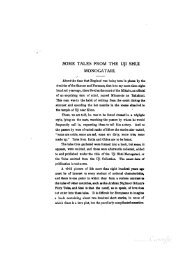Chau Ju-Kua - University of Oregon Libraries
Chau Ju-Kua - University of Oregon Libraries
Chau Ju-Kua - University of Oregon Libraries
Create successful ePaper yourself
Turn your PDF publications into a flip-book with our unique Google optimized e-Paper software.
I,'44 KOREA. 167<br />
There are two great clans called the Kin (^) and the P'o (^[).<br />
During the mt-io period <strong>of</strong> the T'ang dynasty (A. D. 618 — 627) ChQn<br />
Kin (^ ^ or the<br />
M<br />
true Kin) was appointed Prince <strong>of</strong> Lo (or Yo)-lang (i^<br />
J^<br />
3l)'j<br />
^is descendants have always been princes (j^y.<br />
5 During the period k'ai-yau (A. D. 681 — 682) they sent a mission to<br />
ask for the T'ang Ceremonial and their request was complied with*.<br />
Their houses, utensils and implements, their mode <strong>of</strong> dressing and their<br />
methods <strong>of</strong> administration are more or less copies <strong>of</strong> what we have in China.<br />
In their government the people are ruled by severe laws, for which<br />
10 reason <strong>of</strong>fences are <strong>of</strong> rare occurrence; and the idea <strong>of</strong> theft is so foreign to<br />
the people that they do not even pick up things dropped on the road *.<br />
When contracting marriage, they do not send presents. The people can<br />
write, and are fond <strong>of</strong> learning; even the menial classes are given to studious<br />
pursuits; in the villages they have colleges, called «pubUc halls» (^ '^) in<br />
IB the inscriptions over their doors. In these their unmarried sons and younger<br />
brothers are placed in order to study literature and to practice archery.<br />
They have a triennial examination for the degree <strong>of</strong> K^u-jon, also the exami-<br />
nation for the degree <strong>of</strong> Tsin-sM, with the several faculties, as «Exact Scien-<br />
ces)), etc. On account <strong>of</strong> all this the country is styled Kun-tzi-kuo (^ -^<br />
20 PI «the Country <strong>of</strong> Gentleinen»)^<br />
The soil <strong>of</strong> the country is w^ell adapted to the growing <strong>of</strong> rice, and<br />
there are (no) camels or buffalo. They use no cash, but merely barter with<br />
rice. Their household vessels and other implements are all made <strong>of</strong> copper,<br />
and they have two kinds <strong>of</strong> music called the h'u (j^ ^) music and the<br />
25 Mang (^ ^) music'.<br />
During the period ¥ai-ymn (A. D. 713—742) Hing Sh6u (Jf|5 J§)<br />
was sent on a mission <strong>of</strong> condolence (to the Sin-lo Court)*. During the<br />
periods fung-huang (A. D. 923—926) and ch'ang-Mng (A. D. 930—934)<br />
<strong>of</strong> the Five Dynasties, tribute missions were sent to the Court <strong>of</strong> China to<br />
30 perfect the ceremonial; and under the present (Sung) dynasty, in the second<br />
year Men-lung (A. D. 961), they sent tribute; this was repeated in the second<br />
year oiking-kuo (A. D. 977).v<br />
The people <strong>of</strong> this country believe in the theory <strong>of</strong> the male and female<br />
principles, and in good and evil spirits, and are very superstitious. When<br />
35 Chinese envoys arrive, they must first select a lucky day before they can<br />
properly receive the Imperial commands; and, whenever such a message has<br />
been received, an address <strong>of</strong> thanks is written by them to the Emperor, which<br />
is not devoid <strong>of</strong> elegance in style.

















